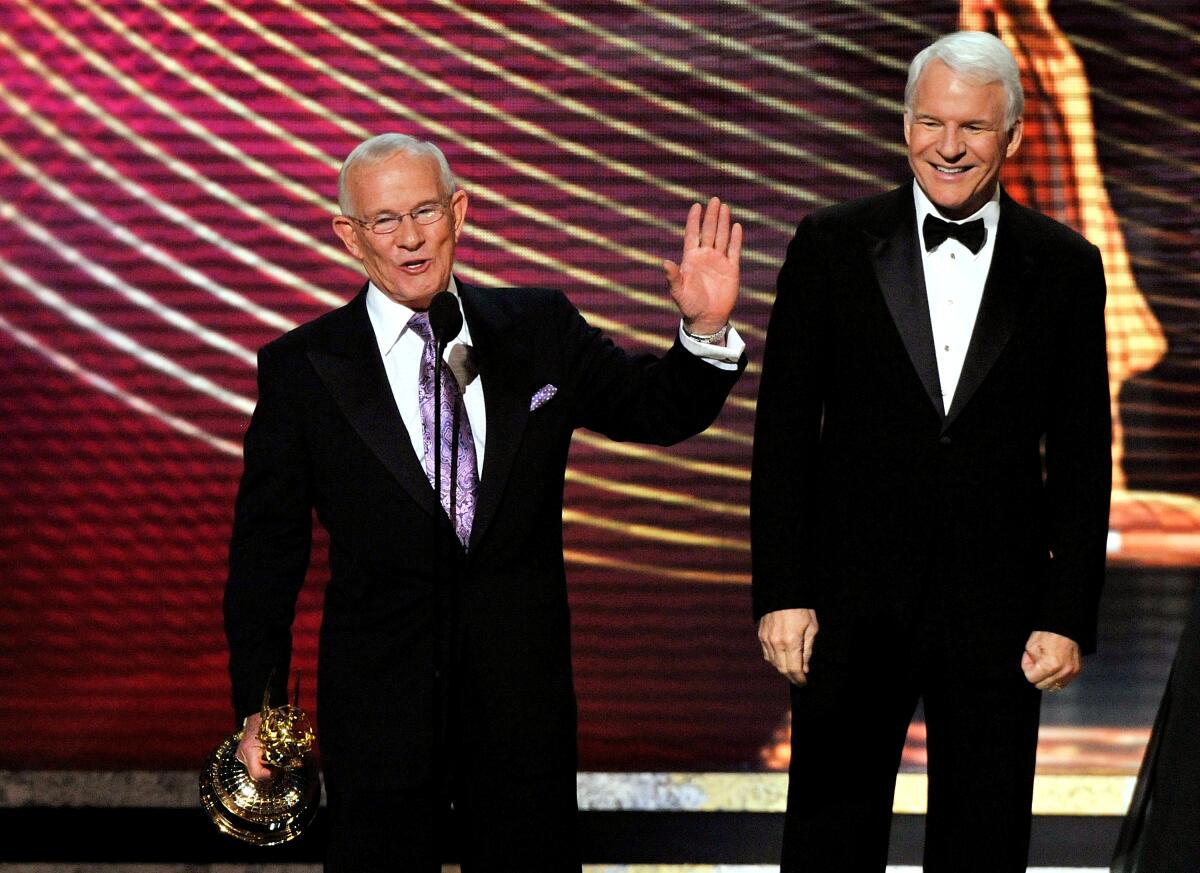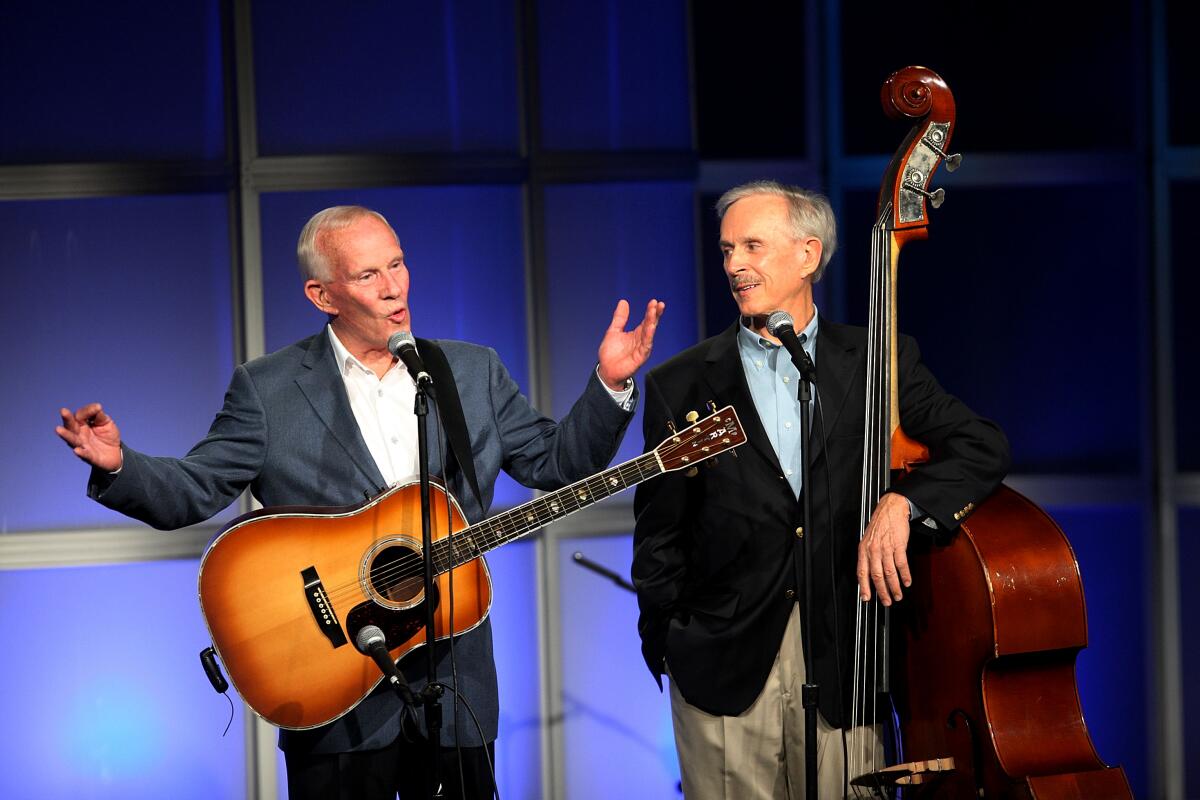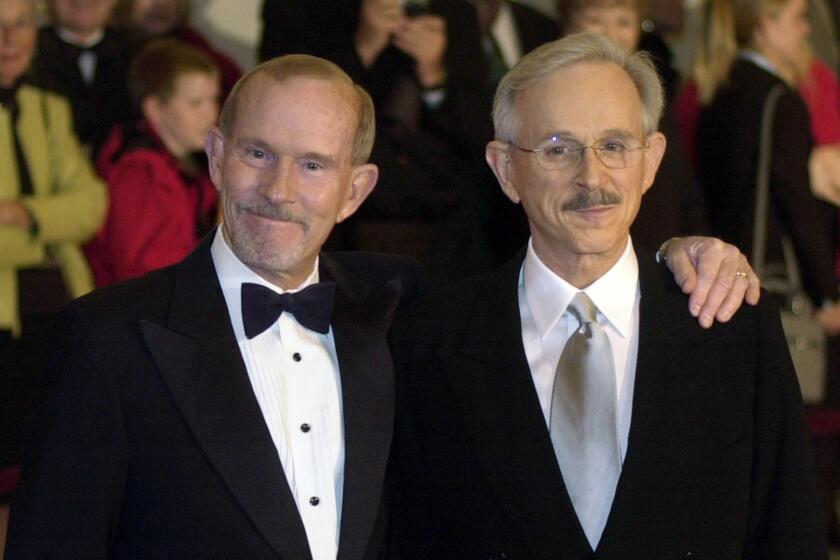Appreciation: What made Tom Smothers a childhood hero of mine — and so many others

- Share via
Tom Smothers, also called Tommy, who died Tuesday at 86, was a childhood hero of mine. He was the older and less mature sibling in the comedy act the Smothers Brothers, who began the 1960s as clean-cut, wholesome, humorous folk singers and ended the decade fired by CBS from “The Smothers Brothers Comedy Hour,” their popular satirical variety show — countercultural by the standards of late ‘60s prime-time, with material addressing Vietnam, race, drugs and national politics — over controversial content and a combative attitude.
Yet through these changes and beyond, through subsequent specials and revivals and years of touring, the act essentially stayed the same, even as the brothers entered their 70s. (They officially retired in 2010, but a tour was in the works when Tom announced his illness.) Brother Dick, who played the double bass, was the judgmental straight man and guitarist Tom the clueless, excitable stooge, the Costello to Dick’s Abbott, the Lewis to his Martin, the Allen to his Burns.
Tom’s character was a child in an adult’s body, who would chuckle and snort at his own jokes and stubbornly defend his most absurd ideas. He would deliver mangled versions of American history or folklore like a schoolboy who hadn’t done his homework, filling in the gaps out of his head. He specialized in sheepish looks, or fleeting displays of self-satisfaction, or naughtiness, darting his eyes here and there, defensively or for approval from the audience. Routines would devolve into bickering, of an escalating volume, as Tom grew tongue-tied and irate in equal measure.
Tom Smothers, one-half of the iconic comedy duo the Smothers Brothers, has died at age 86 after battling cancer. He was the older brother of Dick Smothers.
Nothing delights a child so much as an adult who acts like a child — Harpo Marx, Steve Martin, Pee-Wee Herman. To a kid, these people feel like peers, co-conspirators against the adult world. They are funny to you from an early age. And for audiences of any age, there is something about out-and-out, unapologetic silliness that forms a rebuke to the ordinary. It upends the natural order. It is also perennially funny; because it refers only to itself, it doesn’t date. Looking over and listening to clips of the Smothers over the last few days, I laughed as hard as ever.
That Tom was a yo-yo expert was perfectly in tune with his character. As Yo-Yo Man he would dance and mug and perform tricks, and via their 1988 “The Smothers Brothers Comedy Hour” — a revival that found them back on CBS — seems to have called a new generation to the hobby. One of the sweetest tributes to Smothers can be found on the YoYoExpert website, where fans reminisce about the brothers’ “Just say YO: The Yo-Yo Man Instructional Video” and post photographs of their Smothers-branded yo-yos.

In the days before you could watch entire concerts by any comic any time your phone is charged, the only ways to access comedy were live, on television and on record albums. And because this was an economy of scarcity, these appearances and recordings were precious. There were several Smothers Brothers albums in our house — “Mom Always Liked You Best!,” “Curb Your Tongue, Knave!,” “It Must Have Been Something I Said!” — whose grooves were worn down to nothing and whose routines were burned into memory.
For the record:
3:21 p.m. Jan. 1, 2024An earlier version of this article misstated the album title “Curb Your Tongue, Knave!” as “Hold Your Tongue, Knave!”
By happenstance, my father wound up working in an office across from the Smothers’ managers and became friendly with them. So when my family saw them perform at the Pasadena Civic Auditorium, for no particularly good reason I found myself ushered backstage before the show, where Tom was suffering an ulcer attack, and someone was being sent out to find a quart of milk. (Suffice it to say, it wasn’t a real meeting, though it is a lasting memory.) Nevertheless, they were on point and hilarious, even the bits I already knew backward and forward.
The year 1968, as I remember it, had the quality of lasting longer than other years, of being in no hurry to be through with you, like a predator playing with its prey before swallowing it whole.
Tom was of course not a nincompoop, but a serious, thoughtful person who hungered to add substance to sketch comedy. Indeed, he was the driving force behind “The Smothers Brothers Comedy Hour,” with creative control, and assembled a team of young writers (the Smothers were barely 30 themselves) in a time when to be young, for many, was to be politically aware and anti-establishment. Writers on the show, who were sometimes performers, included Martin; Rob Reiner, who was only 19; Bob Einstein, who played mace-carrying voice of arbitrary authority Officer Judy; Leigh French, whose “Share a Little Tea With Goldie” segment was a place to park drug jokes; Pat Paulsen, deadpan deliverer of “editorials” and 1968 “presidential candidate”; and Mason Williams, who premiered his instrumental hit “Classical Gas” on the show and whom Tom later described as providing “huge ethical, moral support for me.”
At the same time, the show was a sort of freak in straight clothing, the brothers in their familiar matching blazers, dancers in “Music Man” outfits to open the show, Nelson Riddle and His Orchestra, plenty of guests from old Hollywood. (These were generally better used than in other variety shows of the time; Jack Benny and George Burns were especially funny, standing in for Tom and Dick.) For my 12th birthday, I saw the show taped, with guests: Nancy Sinatra and Frank Sinatra Jr. I remember Tom doing a handstand, Paulsen delivering an editorial and the main sketch, something called “Phantom of the Discotheque,” which may have involved a trampoline. (Tom was the Phantom.)
It was very exciting to be there, and the series as it evolved through the difficult year of 1968 and into 1969 fit into my life; it was in its way educational and consciousness-raising. And yet when I think of the Smothers Brothers, I think first of Tom insisting to Dick, “Mom always liked you best” or insisting that crevices — or “cravases” — full of pumas endangered the men who built the railroads, as much a threat to normality as any of the brothers’ political sketches. These routines are what they carried through the years, like the Rolling Stones with “Satisfaction,” expertly dispatched, always killing. There was no Tom without Dick, but who wouldn’t rather be Tom, if it came to that? Then as now, I am for the stooge, the one with the energy, the cockeyed view of the world, the nut. It’s something I still aspire to.
More to Read
The complete guide to home viewing
Get Screen Gab for everything about the TV shows and streaming movies everyone’s talking about.
You may occasionally receive promotional content from the Los Angeles Times.








